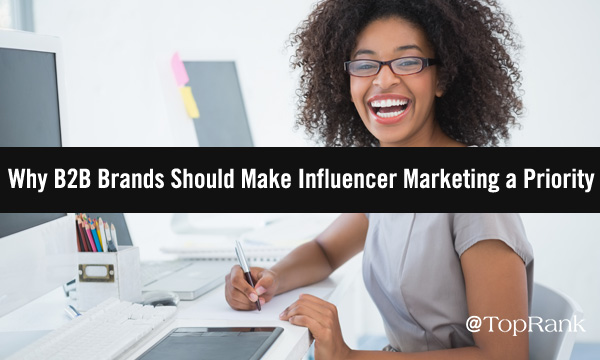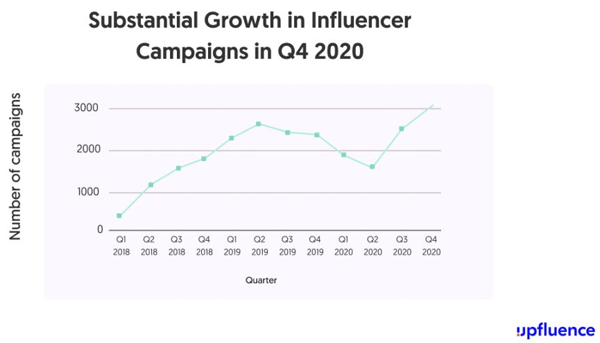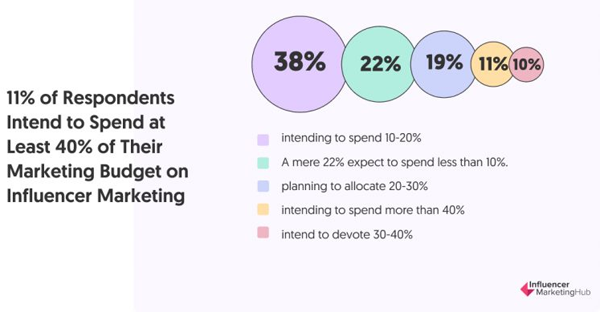
Influencer marketing has seen increasing investment, and global brand spending is expected to reach up to $15 billion by 2022, nearly doubling the $8 billion the influencer marketing industry was worth in 2019, according to Business Insider Intelligence report data.
Other predictions forecast influencer marketing spending to grow to $13.8 billion in 2021 (Influencer Marketing Hub), and $24.1 billion by 2025 (MarketsandMarkets).
It’s become more common, however, for B2B marketers to lament, “I want to explore B2B influencer marketing, but how can I find the time and get the resources to do it?”
Let’s take a look at some of the factors that have led major B2B brands to shift so much more spending to influencer marketing — factors that when brought into focus will drive even the biggest skeptics to commit time and resources.
Influence Builds Trust & Credibility
B2B influencer marketing is built on the fundamentally invaluable strength of trust and credibility, making it little wonder the industry is expected to reach $15 billion by next year.
Today’s B2B buyers are often overwhelmed with options, and are increasingly distrustful of marketing and advertising. 70 percent of respondents to the 2021 Edelman Trust Barometer study recently noted that brand trust is more important today than ever.
Here are just a few of the ways B2B influencer marketing helps build both credibility and trust, according to our own groundbreaking inaugural State of B2B Influencer Marketing Report:
- 78 percent of B2B marketers believe prospects rely on advice from influencers
- 74 percent agree that influencer marketing improves customer and prospect experiences
- 63 percent agree that marketing would have better results if it included a B2B influencer marketing program
- 84 percent of B2B marketers say they engage influencers to create brand awareness
As our CEO and co-founder Lee Odden recently noted in “How the Most Successful B2B Marketers Approach Influencer Marketing in 2021,” “Collaborating on content of mutual value provides influencers an incentive to help share content with potential customers who are likely ignoring ads and formal brand marketing.”
“B2B influencer marketing is built on the fundamentally invaluable strength of trust and credibility, making it little wonder the industry is expected to reach $15 billion by 2022.” — Lane R. Ellis @lanerellis Click To Tweet
True Brand Advocates Deliver Proven Return on Investment
In the fiercely competitive and oftentimes mistrusting business marketing landscape of 2021, the power of B2B influencer marketing to create true brand advocates can’t be understated.
65 percent of consumers said that they don’t trust advertising, and 55 percent don’t even trust the companies they buy from, according to HubSpot survey data — a harsh reality that thankfully can be overcome by giving consumers credible, engaging content that’s relevant, useful, credible, trustworthy, and experiential — all areas where B2B influencer marketing excels.
Our research also outlines a vast array of strong cases for the power of influence to deliver results, including:
- 96 percent of B2B marketers who engage influencers consider their program to be successful
- 96% of B2B brands are confident about influencer marketing
- 90 percent expect their budget for influencer marketing to increase or stay the same over the next year
- 69 percent say they count on influencers for lead generation
It’s clear that B2B influencer marketing builds the type of quality relationships with trusted voices who can advocate organically for a brand, which leads to delivering improved ROI when a smart program is implemented.
It’s no wonder that during the fourth quarter of 2020 significant growth was seen in the number of influencer campaigns, as shown in the follow Upfluence chart.

“In the fiercely competitive and oftentimes mistrusting business marketing landscape of 2021, the power of B2B influencer marketing to create true brand advocates can’t be understated.” — Lane R. Ellis @lanerellis Click To Tweet
B2B Influencer Marketing Is Relatable & Empathetic
It’s a win-win when brands utilize the inherent strengths of B2B influencer marketing to build customer relationships that are genuinely relatable and authentically empathetic.
B2B influencer marketing offers a more human-focused approach to building relatability and empathy. Our senior content marketing manager Joshua Nite recently wrote about this key approach in “5 Ways to Humanize Your B2B Content Marketing – And Why It Matters.”
“When you involve influencers in your content, you’re adding additional human voices to your content. Let the influential people in your industry add their credibility, expertise, and most importantly, personality to your content. It’ll make your content smarter, more personable, and more likely to connect with people,” Joshua noted.
Here are several reasons why B2B influencer marketing makes brands more relatable and builds greater empathy:
- 77 percent of marketers say their prospective customers rely on advice from industry experts (1)
- B2B influencer marketing can solve some of the biggest problems in terms of creating credible connections with people that are actively interested in paying attention, and by co-creating content marketing content with those who have influence
- If a brand is empathizing with an influencer, they’re not only finding out if they’re topically relevant for the thing they want to collaborate on, but they also understand the influencer’s motivations, needs, wants, pain points, and the return on investment (ROI) to which a collaboration with a brand will help solve these issues
“It’s a win-win when brands utilize the inherent strengths of B2B influencer marketing to build customer relationships that are genuinely relatable and empathetic.” — Lane R. Ellis @lanerellis Click To Tweet
Influencers Provide Brands Mutually-Beneficial Partnerships
B2B influencer marketing builds the kind of mutually beneficial partnerships between brands and the subject matter experts that customers trust.
It’s important to collaborate and co-create content with influencers in a way that creates mutual value for the influencer and the brand in a way that is measurable and equitable.
Here are four reasons why brands that build successful B2B influencer marketing programs gain these types of mutually-beneficial partnerships:
- 87 percent of B2B marketers who use influencer marketing say they use it to collaborate on content (1)
- 64 percent of B2B marketers increased the credibility of brand content working with influencers (1)
- When it comes to B2B influencers, you’ve got people who are genuinely invested in making the industry a better place
- B2B influencer marketing provides content useful for demand and lead generation, with 53 percent of B2B marketers noting they’ve increased new leads by working with influencers (1)
“B2B influencer marketing builds the kind of mutually beneficial partnerships between brands and the subject matter experts that customers trust.” — Lane R. Ellis @lanerellis Click To Tweet
Long-Term Success From Always-On Programs
Always-on B2B influencer marketing thrives in making the type of lifelong commitment to clients and customers that creates fierce, avid fans. Despite this, just 19 percent of B2B marketers are running ongoing influencer marketing programs, our research shows.
Always-on influencer marketing doesn’t take as much work as you might think, however, and it all starts with a strategy.
“Influencer marketing can impact B2B marketing efforts across the customer lifecycle, from creating greater brand awareness to lead generation to inspiring advocacy.” — Lee Odden @LeeOdden Click To Tweet
Among the many reasons why ongoing B2B influencer marketing programs are successful, the following insights from our research help drive home the point:
- 60 percent of marketers who use always-on influencer marketing programs are very successful versus 5 percent who do periodic campaigns
- 12 times more marketers are very successful when they run an always-on influencer program versus those who opt for periodic campaigns
- 89 percent of B2B marketers who use an always-on approach expect their budgets to increase or remain the same in the next 12 months
- 94 percent say that influencer marketing will grow in importance over the next 12 months
- 75 percent saw an increase in their views of brand content using an always-on approach
Research from Influencer Marketing Hub shows that 11 percent of survey respondents intend to spend at least 40 percent of their entire marketing budget on influence marketing, and that almost nine percent of brands spend more than $500K on influencer marketing.

“Always-on B2B influencer marketing thrives in making the type of lifelong commitment to clients and customers that creates fierce, avid fans.” — Lane R. Ellis @lanerellis Click To Tweet
Technology & Influence Create A Strong One-Two Punch
B2B marketers who utilize technology such as Traackr, BuzzSumo, and Onalytica in their influencer marketing programs get an especially potent wallop when it comes to efficiency and reporting.
During the pandemic, social media users have also increased their engagement levels with content from industry influencers, led by the technology industry, which saw a 440 percent increase from 2019 to 2020 — according to recently-released Onalytica report data.
Just half of B2B marketers include a plan for influencer activation in their strategy, however, and 41 percent are not using any technology, according to our research.
Here are just a few of the activities and advantages our research shows are possible when it comes to using technology to manage influencer marketing:
- Monitoring influencer social platform activity
- Gauging program effectiveness
- Managing and nurturing influencer relationships
- Coordinating influencer activation
- 90 percent of B2B marketers integrate influencer marketing with social media
- 83 percent integrate it with content marketing activities
- 68 percent of the most successful influencer marketers have a documented strategy versus 25 percent of the least successful marketers
“B2B marketers who utilize technology such as Traackr, BuzzSumo, and Onalytica in their influencer marketing programs get an especially potent wallop when it comes to efficiency and reporting.” — Lane R. Ellis @lanerellis Click To Tweet
Committing Brand Resources & Time To Influencer Marketing Invests In Success
By now it should be clear that devoting time and resources to B2B influencer marketing is a smart investment that brands skip at their own peril.
The next time you hear a B2B marketer say, “I’d like to try B2B influencer marketing but how do I get the time and resources?” be sure to keep in mind the statistics and report findings we’ve outlined here.
To learn more about B2B influencer marketing, some of the top practitioners in the industry from global brands have joined our CEO Lee for the popular ongoing Inside B2B Influence video interview series, which makes it a great resource for getting 2021’s newest insight into the power of influence.
A growing number of B2B brands also utilize a dedicated specialist B2B influencer marketing agency such as TopRank Marketing, which has worked with brands from Adobe, LinkedIn, and SAP to 3M, Dell, Oracle and many more. Our research shows that 60 percent of marketers don’t have the right in-house skills or knowledge to execute an influencer marketing program. Learn how to begin an influencer marketing pilot program or start a full-fledged always-on influencer program.
Sources: (1) TopRank Marketing 2020 State of B2B Influencer Marketing Report.

Comments are Closed